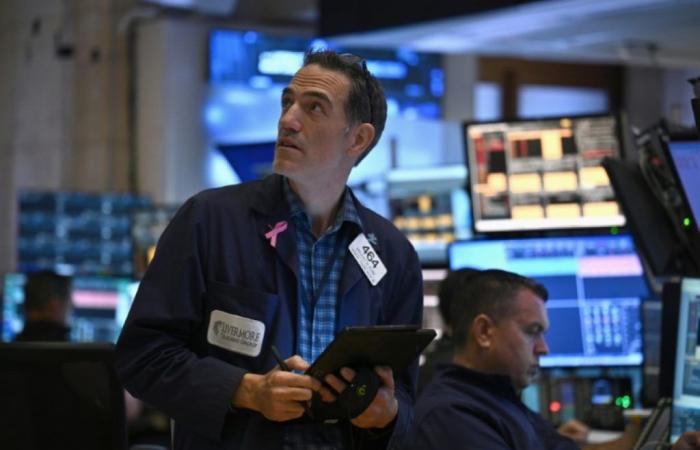Operators of the New York Stock Exchange (AFP / ANGELA WEISS)
The New York Stock Exchange opened lower on Thursday, digesting American inflation that was still slowing in September, but which came out above expectations.
Around 2:20 p.m. GMT, the Dow Jones lost 0.12%, the Nasdaq index 0.18% and the broader S&P 500 index lost 0.15%.
Inflation returned to 2.4% over one year compared to 2.5% in August, according to the CPI index published Thursday by the Commerce Department, its lowest level in more than three years.
Over one month, prices increased by 0.2%, remaining at the same pace as the previous two months.
The figures are less good than expected: over one year, analysts expected a 2.3% increase in consumer prices, according to the consensus published by MarketWatch.
Core inflation, that is to say excluding the price of food and energy, reached 0.3% over one month, the same as in August, and 3.3%. over one year, compared to 3.2% a month earlier.
“The market is down a bit because of two things. First, (the CPI) changes the outlook for future rate cuts from the US central bank (Fed),” commented Adam Sarhan of 50 Park Investments.
“Second, it also increases the risk, or likelihood, that inflation will rise again,” he continued.
The US Federal Reserve lowered its key rates by half a percentage point in September, and markets expect a quarter-point cut at the next meeting, scheduled for November 6-7, followed by a another of the same magnitude during the last meeting of the year, mid-December, according to the CME monitoring tool, FedWatch.
The American market is now awaiting the PPI producer price index which will be published on Friday.
New weekly applications for unemployment benefits in the United States, also published Thursday, are up slightly: 258,000 compared to 225,000 last week, probably inflated by “the impact of Hurricane Helene”, which crossed the southern States -United at the end of September, according to Bill Adams of Comerica Bank.
“Claims will increase further in the coming weeks due to the devastation caused by Hurricane Milton,” he said.
This hurricane, category 3 out of 5, made landfall in Florida on Wednesday evening, causing significant damage. Thursday morning, more than 3 million homes were without electricity.
On the bond market, the yield on 10-year US government bonds stagnated around the same rate as the day before at closing, namely 4.07%. At two years, it stood at 3.97%, after 4.02%.
On the stock market, the airline company Delta Air Lines lost ground (-1.00%) after the publication on Thursday of proforma earnings per share slightly lower than analysts’ expectations, affected by the consequences of the global IT outage of a software from the Crowdstrike group and by Hurricane Helene.
Results from financial institutions, including JPMorgan Chase and Wells Fargo, are expected on Friday.
The British pharmaceutical giant GSK soared (+4.42%) after announcing agreements worth nearly $2.3 billion on Wednesday to end a majority of cases pending before the country’s courts in which its drug Zantac is accused of causing cancer.
After a plunge at the start of the week caused by the absence of new stimulus measures in China, the e-commerce giants listed in New York continued in the red, including PDD (-1.17%%). Alibaba, however, managed to keep its head above water (+0.73%).
Energy was doing well, like ExxonMobil (+0.77%), Chevron (0.82%), ConocoPhillips (0.91%) and EOG Resources (+0.32%).
The giant capitalizations of the Nasdaq moved in a dispersed order. Apple (-0.71%), Microsoft (-0.52%) and Broadcom (-0.90%) were losing momentum. Adobe (+0.75%) and Nvidia (+1.00%) rose.
Nasdaq






